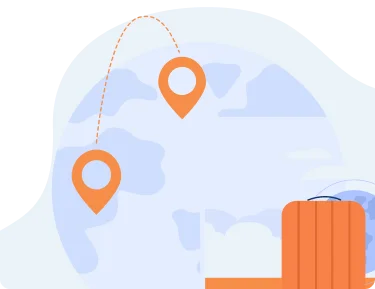5 Important Nuances Americans Need to Know Before Buying in France - FrenchEntrée

Published first: October 25, 2022, by Zoe Smith 2
Required reading
With the U.S. dollar to euro exchange rate at its highest in two decades, it's no wonder that more and more Americans are being seduced by the dream of buying a vacation home or real estate investment in France. While many American buyers successfully purchase French real estate every year, there are some drawbacks and potential pitfalls that U.S. citizens should look out for, so it's important to do your homework before buying. Before you begin your search for a dreamy vacation home in France, here are five things you should know.
1. You may not be able to get a French mortgage
The mortgage market in France is shrinking in light of recent developments, with banks introducing stricter eligibility criteria and a gradual increase in interest rates even for French residents. While French mortgages are still available to foreign buyers and non-residents, our experienced advisors at International Private Finance emphasize that US citizens living in the US are unfortunately being placed under the most stringent suitability criteria, with more and more banks refusing to lend to Americans. It is also worth mentioning that under French law, only French banks can lend against French real estate, so you will not be able to take out a foreign mortgage. The situation is constantly changing, so it is highly recommended that you get up-to-date advice from an international mortgage advisor if you are relying on a French mortgage to finance your property purchase. Alternatively, it may be worth considering other options. Most importantly: it's definitely a buyer's market for US buyers right now, especially cash buyers.
2- Opening a French bank account may be more complicated than you think
While many French banks offer accounts to non-residents, FATCA (Foreign Account Tax Compliance Act) requirements mean that more banks in France are refusing to open accounts for US citizens. FATCA legislation was added to the US tax code in 2014 to prevent tax evasion by US citizens living abroad or holding foreign accounts, and essentially requires any international bank with accounts held by US taxpayers to report to the US IRS. Practically speaking, this can be time-consuming and costly (and have legal ramifications) for French banks, so many simply refuse to open accounts for US citizens. The good news is that while it can simplify things, especially for managing your second home in the long run, you don't actually need to have a bank account in France to purchase real estate in France. A currency exchange specialist such as Moneycorp will be able to make the initial payments for you, and you may have better luck opening an account once you have a registered address in France. Read our guide to opening a non-resident account in France.
3. You will probably need the services of a tax specialist
The United States is one of the few countries that requires its citizens to file a U.S. tax return regardless of their residency status. This means that even if you decide to move to France one day, you will still have to file a U.S. tax return even though there is double taxation between France and the United States.




4. You may need a visa
If you are buying a home in France, remember that you will be subject to the 90/180 day rule when visiting your property. If you have dreams of splitting time between your American and French residences, you will have to manage your time carefully to take advantage of visa-free travel. Otherwise, you will need to apply for a temporary long-term visa, which will allow you to stay in France for up to six months and come and go as many times as you like during that time period. If you want to make additional trips beyond this six-month period, the good news is that the temporary long-term visa period doesn't count towards your 90 days (read our article on how this works). However, it's worth remembering that unless you plan to become a French resident and, most importantly, subject to French tax, you must not stay in France for more than 183 days in any calendar year. Read our article Understanding French tax - Are you a French tax resident?
5. You will probably need more documents than you think you will need
Everyone who has ever moved to France or bought property in France (including the French themselves!) will tell you the same thing - the French love paperwork! When purchasing property in France, it is important to understand that you will be asked to provide quite an extensive dossier, including personal documents (such as your birth certificate, marriage certificate(s), and divorce certificate(s)), proof of address, and financial documents that confirm your income, outstanding loans, and savings - especially if you are applying for a French mortgage. Additionally, you will be provided with numerous documents from the notary on behalf of the seller when signing the Compromis de Vente - the first sales contract you will sign when buying in France. The main thing to remember here is that the Compromis de Vente is legally binding, and of course, the contract and all accompanying documents will be in French! That’s why it’s so important to hire your own translator or legal advisor - before you sign the document.
Join our free webinar "Buying in France for Americans." If you are planning to purchase property in France, our free webinar is the perfect opportunity to gain clarity on all the aforementioned topics and ask your questions to the experts. Join me on Tuesday, November 8, at 12:00 PM (Eastern Time) and get the latest tips from our team of experts, including international French real estate agents from Agence Newton, tax specialists from Citrine International, and currency exchange experts from Moneycorp. We will answer all your questions about the French real estate market, currency exchange, and taxes, focusing primarily on buyers from the United States.
Register for the free webinar here or click the button below.
Share with: Facebook Twitter LinkedIn Email
Related articles by Zoe Smith, editor of FrenchEntrée. Zoe is also a freelance journalist who has written for the Telegraph, HuffPost, and CNN, and she updates the Rough Guide to France and the Rough Guide to Dordogne & Lot. She lives in the French countryside, not far from the city of Nantes.
Your email address will not be published. Required fields are marked with *
Comments
We will find property in France for you
- 🔸 Reliable new buildings and ready-made apartments
- 🔸 Without commissions and intermediaries
- 🔸 Online display and remote transaction
Our managers will help you choose a property
Liliya
International Real Estate Consultant

Subscribe to the newsletter from Hatamatata.com!
Subscribe to the newsletter from Hatamatata.com!
Popular Posts
We will find property in France for you
- 🔸 Reliable new buildings and ready-made apartments
- 🔸 Without commissions and intermediaries
- 🔸 Online display and remote transaction
Our managers will help you choose a property
Liliya
International Real Estate Consultant

Subscribe to the newsletter from Hatamatata.com!
Subscribe to the newsletter from Hatamatata.com!
I agree to the processing of personal data and confidentiality rules of Hatamatata
Popular Offers


Need advice on your situation?
Get a free consultation on purchasing real estate overseas. We’ll discuss your goals, suggest the best strategies and countries, and explain how to complete the purchase step by step. You’ll get clear answers to all your questions about buying, investing, and relocating abroad.


Irina Nikolaeva
Sales Director, HataMatata



